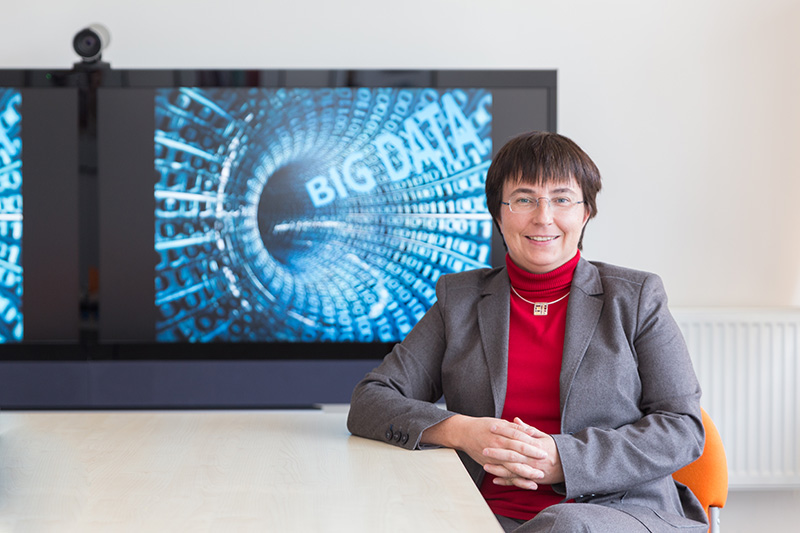Creating Enthusiasm for the Interdisciplinary Information Systems
Eleven questions for Prof. Dr. Barbara Dinter, Professor of Business Information Systems I since April 2014
-

”My main research – the management of big data, has points of contact and areas of application in almost all faculties, for instance in the cutting-edge Industry 4.0 topic of Mechanical Engineering,” says Prof. Dr. Barbara Dinter. Photo: Steve Conrad
Prof. Dr. Barbara Dinter has held the Professorship of Business Information Systems I (Business Process and Information Management) in the Faculty of Economics and Business Administration since April 2014. In eleven answers, she gives the readers of “University News“ insight into her professional background, scientific objectives and activities in Chemnitz.
What is actually meant by “business process and information management“?
There are two main design fields in business information systems, whereby business process management focuses on the design of business workflows (processes) and the information management addresses the resource information – the latter one is more important than ever in today`s era of big data.
The TU Chemnitz is the right choice for me as a professor, because…
… here I have found a cooperative environment and good working conditions, because it is a technical university with many interdisciplinary areas of overlap, and Bavaria has always gotten along well with Saxony (so to speak: from free state to free state).
Can you say a few words about your academic career so far?
As a real “Münchner Kindl” (even if I don’t talk like that), I studied Computer Science at the Technische Universität München and received a doctorate in the field of Databases. After several years in consulting, I was drawn back into the academic world. With my habilitation (post-doctoral lecture qualification) at the Business School of St. Gallen University, I have now established myself in the interdisciplinary field of business information systems and I feel very comfortable here. As of 2010, I was already able to represent my professorship in Chemnitz for two years.
Describe your years of study in only a few words.
Shared apartment, intensive study phases, mountains and backpacking, mathematical challenges, diverse jobs (from student assistant to selling vegetables at the weekly market), 8 inch floppy discs (every freshman received one), lifelong friends, university parish.
Did you have role models during your studies who encouraged you to pursue a scientific career?
Some of the professors tried with their heart and soul to bring their research and practical experience closer to us students. But especially while writing my thesis, I got a taste for academia. A fascinating topic in an industrial cooperation, a nice team at the professorship, an internship at the University of Melbourne between my diploma thesis and the diploma degree and participation in scientific conferences during the study period – all these factors contributed to me never even considering other applications, when I was offered a practice-oriented doctorate at the same professorship.
Do you have any advice for young students and graduates?
Studying provides opportunities and freedoms that don’t reappear later in the same way. In this respect, I strongly suggest that students visit lectures that interest them beyond their course plans, and to get involved in projects such as summer schools, working groups, etc. even if they bring no credits, but enrich the personality and open up new horizons. In particular, I recommend spending time abroad during the study period and, so to say, combine the pleasant with the useful.
What would you like to achieve in your teachings in the future?
I want to inspire students for business information systems, because this subject offers plenty of latitude for individual specialization and opens doors to various professions and businesses after graduation. I would like to motivate “my“ Master’s degree students, in accordance with the advice given above, for more internationality and commitment outside of the compulsory curriculum.
What impact does your research have at the TU Chemnitz?
My main research – the management of big data, has points of contact and areas of application in almost all faculties, for instance in the cutting-edge Industry 4.0 topic of Mechanical Engineering. With the establishment of our own big data laboratory at my professorship, the conditions for interdisciplinary research will be created.
There are around 45,000 professors at German universities. What distinguishes you from all others?
Firstly, I consider myself lucky to be among the 45,000 professors (my dream job!). I do not need to distinguish myself, but if I contribute to some extent to embody the ideal of my profession (however it may be defined), then I have achieved my goal.
What is your favorite place to show guests in Chemnitz?
The “Nischel“ is kind of a requirement, because most of the guests want to see it. And although not quite so much of an all-season option: I like to stroll with my visitors through the Christmas markets in Chemnitz and the Erzgebirge.
How do you play a part in the life of the city?
Currently, it still takes place mainly on a professional level, for instance in the form of cooperation with a local partner in a BMBF project. But I hope to find more time to connect with leisure and culture in the near future.
Further information about the professorship: https://www.tu-chemnitz.de/wirtschaft/wi1/
(Translation: Nataliia Boiko and Sarah Wilson)
Katharina Thehos
18.06.2015




